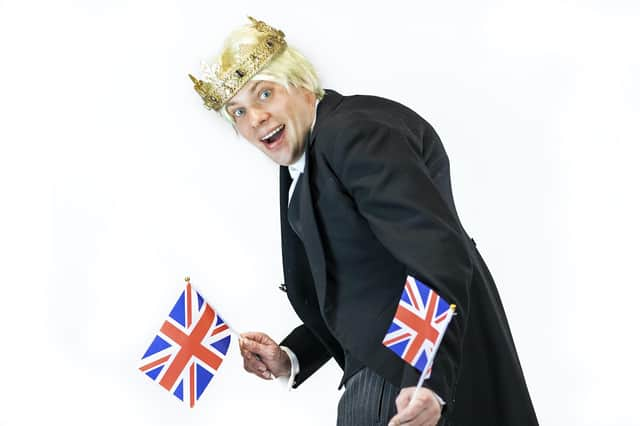Boris Johnson's Fringe exit


Boris Johnson played Richard III in a school play. Apparently he wasn’t prepared, didn’t learn his lines, resorted to clowning about, and the result was chaos. Someone posted this story on social media recently, intimating that the warning signs for what kind of prime minister Boris would be had long been there.
It was an irresistible theatrical metaphor, especially appealing for someone like me who has specialised in presenting plays that go off-the-rails, directing shows for Mischief Theatre (the ‘Goes Wrong’ brand-masters).
Advertisement
Hide AdWritten towards the end of the last lockdown, my play Boris the Third is a rise-and-fall story, mirroring Shakespeare’s tragedy Richard of Gloucester - a character so iconic that you could recognise him by silhouette alone. There is something in the crookback king that brings to mind the well-known photograph of Boris dangling from a zip line, with ill-fitting helmet, and union flags held like awkward little erections.
The rise part of the story was obvious. Boris became PM with a mixture of scheming, clowning, and hijacking populist causes like Brexit. But the fall was still a prediction - an imagining that, some day, the ghosts of those he had betrayed would return to haunt our eighteen-year-old-Etonian-schoolboy-Richard. And would you believe it, but in early July, Boris fell, in precisely that manner, after an avalanche of scandals and resignations.
All of this, remarkably, left me with a play more prescient and relevant than it had been only a few weeks previously.
I write this from rehearsals, battling fresh chaos; disruptions caused by Covid infections and brutal heatwaves. I’ve made some changes to the script, to keep it connected to current events, and I will continue to do so throughout its run in August. But overall, the play has become less like a fantasy and more like real life.
Now that the reign of Boris, self-styled ‘King-of-the-World’ (as his sister once alleged he aspired to be), has come to an end, I feel the need to reflect upon what has happened over the past few years. I started telling the story of a man who, having played the clown so effectively, became trapped in its persona, alienating his allies as well as an increasingly disenchanted public and media. Now it’s become an investigation into the roots of privilege, the origins of conviction in one’s righteousness, regardless of the cost. As Martin Hammond’s school report on Boris famously records: ‘I think he honestly believes that it is churlish of us not to regard him as an exception, one who should be free of the network of obligation which binds everyone else.’
It's hard to satirise someone with little shame or scant regard for how they are perceived; a man who once hid in a fridge to avoid journalists, a man whose track record for sexual antics wouldn’t be out of place in a 1970s farce. Instead, I have attempted to understand. Boris the Third is no longer purely satire – it’s become a way of processing and purging. How did this man win the last election so convincingly when evidence of his irreverence (at times, contempt) for office was so clear for so long? Certainly, much of it can be traced back to Eton, when the teenage Boris, initially championing traditions and aspiring to be Captain of School, took his bumbling persona to the stage, and, perhaps for the first time, alienated those around him.
Advertisement
Hide AdEven since his quasi-resignation, problems surround him with serious consequences. In mid-July there was an emergency Cobra meeting to discuss that same heatwave that struck our rehearsals and disrupted the whole country. Boris, apparently, wasn’t at that meeting. He was hosting a party at Chequers.
The death-throes of the illicit parties (that will forever define his legacy) can be heard rattling like bottles in the bin. The neighbours are upset, the police are at the door, and the cold, stark lights of reality are on. There is chaos. And we must all live with the mess.
Boris the Third is at the Pleasance Courtyard, 3-29 August.